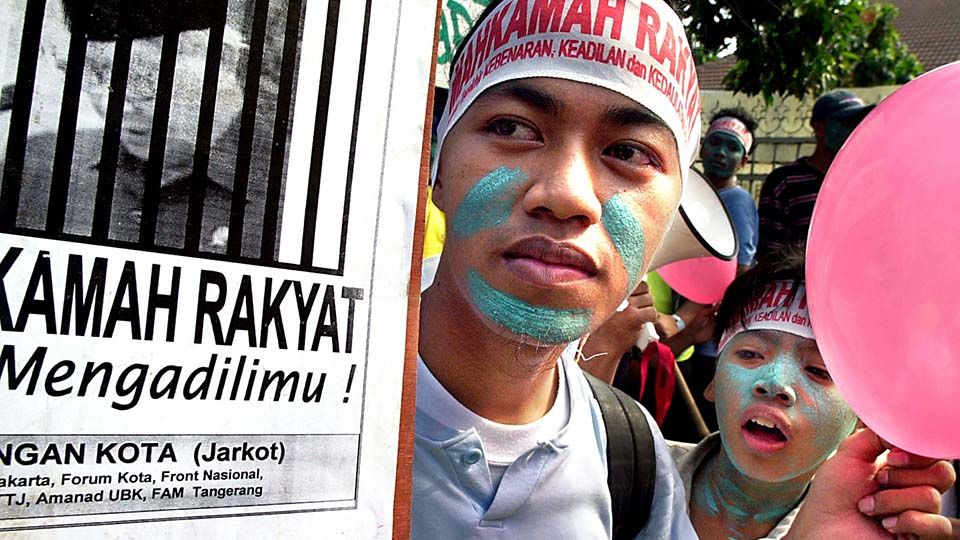May 19, 2025
JAKARTA – Agrowing wave of international condemnation has poured in over the renewed effort to name late president Soeharto as a national hero, with a coalition of global civic groups warning the plan could whitewash decades of human rights abuses and corruption by the former leader.
Soeharto, who was also the former father-in-law of President Prabowo Subianto, has been included on the list of nominees for this year’s national heroes that is still under the scrutiny of the Social Affairs Ministry’s Central Research and Assessment Team for Title (TP2GP).
More than 30 civic groups and prominent individuals from across the globe voiced their strong opposition to the proposal. In a joint statement released on Thursday, they called the proposal a “brazen insult” to victims of Soeharto’s 32-year authoritarian regime.
Included in the coalition were the Commission for Missing Persons and Victims of Violence (Kontras), Asian Forum for Human Rights and Development and Africa Network for Environment and Economic Justice.
Read also: Proposal to name Soeharto national hero draws opposition
They asserted that honoring Soeharto as a national hero would “significantly undermine Indonesia’s commitment to uphold human rights in the international community”.
“Granting the title of national hero to a perpetrator of crimes against humanity would constitute a betrayal for victims and survivors of past human rights violations, many of whom have yet to receive recognition, justice or reparations,” the groups said in the statement.
Past sins
The groups also pointed to a review issued last year by the United Nations Human Rights Committee, which criticized Indonesia for its “continuing lack of accountability for past gross human rights violations”, including the nation’s “failure to clarify the outcomes of investigations into atrocities during 1965-1966 and 1997-1998”.
Both periods refer to what observers have called Indonesia’s deadliest years.
An anti-communist purge led to killings of between 500,000 and 3 million members and sympathizers of the Indonesian Communist Party (PKI) between 1965 and 1966, according to figures from the National Commission on Human Rights (Komnas HAM).
The party was blamed for the alleged failed coup attempt launched against then-president Sukarno on Sept. 30, 1965. Soeharto, an Army general, led the military’s attempt to restore security and impose order.
He was appointed the country’s acting president by the Provisional People’s Consultative Assembly (MPRS) in 1967, as Sukarno was lying in bed with sickness. MPRS inaugurated Soeharto as president a year later.
Read also: Prabowo considers naming slain activist Marsinah national hero
Meanwhile, the period of 1997-1998 refers to the forced disappearance of dozens of pro-democracy activists by the military. The kidnappings were closely tied to the lead up of the 1997 elections and the 1998 People’s Consultative Assembly (MPR) general session, which at the time was discussing the replacement of Soeharto.
In the statement, the groups also referred to the 2016 International People’s Tribunal in The Hague, which concluded that the Indonesian military, under Soeharto’s command, played a central role in the massacre of hundreds of thousands of people accused of being communists or its sympathizers between 1965 and 1966.
“The attempt to honor Soeharto as a national hero is a reflection of how political power continues to reproduce itself by sanitizing the past and erasing the memory of state-sponsored violence and repression,” the groups said.
Corrupt past
In addition to the human rights record, the coalition also cited Soeharto as one of the most corrupt leaders, citing Transparency International’s reports that the former president allegedly embezzled up to US$35 billion during his 32-year regime.
The civic groups also referred to reports from the World Bank and UN-backed antigraft bodies that described Soeharto’s regime as a period marked by entrenched nepotism and institutional decay.
“Soeharto bears responsibility for the institutionalization of corruption through the deliberate weakening of state institutions,” the group’s statement said, adding that his administration entrenched “cronyism and corruption among the business elite”.
The coalition calls on the government to reject the proposal and instead focus on resolving past gross human rights violations committed during Soeharto’s presidency, as well as acts of collusion, corruption and nepotism in accordance with international community recommendations.
They also urged Social Affairs Minister Saifullah Yusuf and TP2GP to “engage in transparent, inclusive and accountable communication” regarding the nomination of Indonesia’s national heroes.
It remains unclear who nominated Soeharto in the first place.
Representatives of civic groups, including lawyer Airlangga Julio of Amar Law Firm and Public Interest Law Office, met with Saifullah on Thursday. During the meeting, the ministry’s representative said the proposal was raised by Central Java Governor Ahmad Luthfi earlier this year, as reported by Kompas.id.
But Luthfi denied that he had proposed to the Social Affairs Ministry to bestow Soeharto with a national hero title, as quoted by Kompas.com.
Read also: Human rights minister seeks Rp 20 trillion for rights development
Under a 2012 ministerial regulation, a proposal to nominate a national hero must pass several levels of review before reaching the Social Affairs Ministry. The ministry will then bring the shortlisted names to the board of decorations and honorary titles for examination, before final approval is given by the sitting president around the time of Heroes Day on Nov. 10.
This is not the first time for Soeharto to be nominated as a national hero, as similar attempts took place at least twice in 2010 and 2015.


